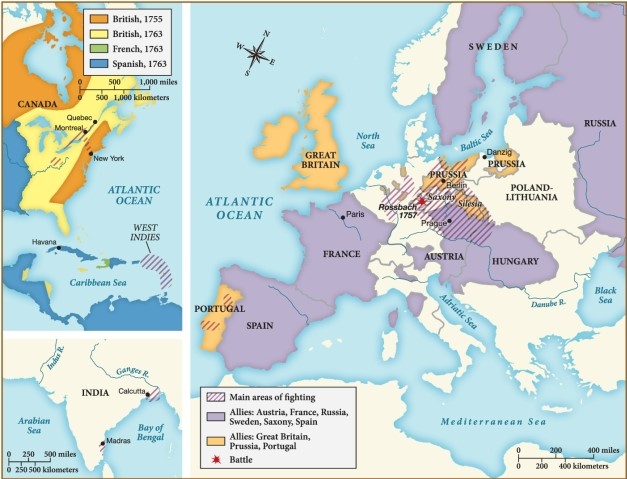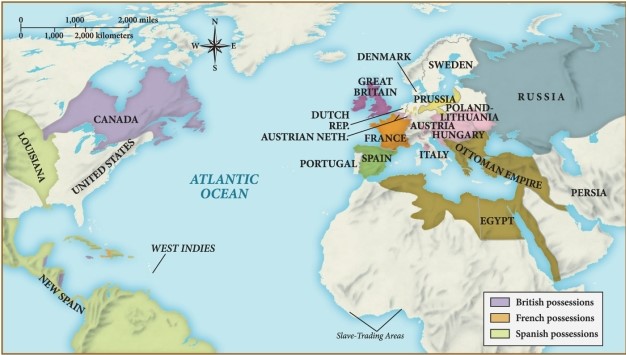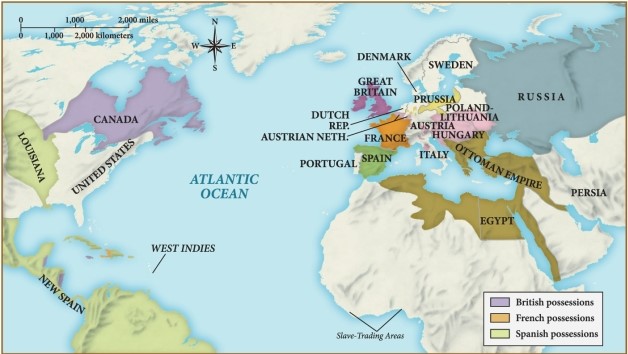Exam 18: The Promise of Enlightenment, 1750-1789
Some historians have argued that a crisis of rising expectations caused some of the riots and rebellions of the late eighteenth century. Because governments raised expectations through talk of reform, the public turned to direct action when they did not see conditions improve as much as they had expected. To what extent does this model accurately sum up each of two direct actions: the so-called Flour War in France in 1775 and the Pugachev rebellion in Russia in 1773? Make sure you consider the extent to which reforms were discussed and implemented in each case. Also consider the effect on the rebels of changes made by the French or Russian governments that were not in keeping with Enlightenment ideals.
Answer would ideally include the following. Although the Enlightenment was in many ways an intellectual movement within the middle and upper classes of Europe, one of its effects was that it caused public opinion to matter to governments and thus created a growing expectation of reform in many arenas. Governments had become accountable for their actions to a much wider range of people than ever before. Ordinary people rioted when they perceived the government as failing to protect them from food shortages or from other economic disasters. In the case of tsarist Russia, the serfs and oppressed minorities rioted against a system that kept them oppressed in order to institute different reforms. In France, a group of economic experts called the physiocrats believed that the government should deregulate the grain trade to encourage the free market and agricultural productivity. This project was put in place by Louis XIV's chief minister, Jacques Turgot, himself a disciple of the physiocrats. This deregulation meant that farmers sold their grain to the highest bidder, even if that bidder was a foreign merchant. This led to a grain shortage and higher grain prices in France. The rising prices led the working classes in several provincial cities to riot against the government and attack grain convoys headed to Paris. The rioters were attempting to bring about a renewal of old-fashioned price regulation using the only means at their disposal, as they had no other access to the political system. They also seemed to believe that it was the duty of the government to assure them access to a reasonably priced food supply. In contrast to the Flour War, the Pugachev rebellion was less about economic expectations than frustration with serfdom. Catherine II of Russia had granted her nobles the privilege of exclusive control over their serfs in exchange for the nobles' loyalty to the state; this arrangement left in place an oppressive system that was not in line with Enlightenment ideas of equality or social reform. Catherine II's reforms had little to no bearing on serfs, and their status was in many ways a compromise that ensured her reforms could be pursued in other arenas. Emelian Pugachev, an army deserter who claimed to be the dead husband of Catherine II, rallied the peasants, who believed he was their "redeemer tsar" who had come to free them from oppression. He convinced Cossacks such as himself who resented the loss of their tribal independence, as well as others, to rise up against the Russian government. Nearly three million people participated, making it the largest rebellion in the history of tsarist Russia. They attempted to attack the nobility and seize noble estates, clearly rioting against the hierarchical system that oppressed them.
What role did eighteenth-century Parisian salons play in the spread of Enlightenment ideas?
D
How did the Encyclopedia contribute to Enlightenment goals of social reform?
A
What new texts did abolitionists use in their petitions and campaigns to end the slave trade and slavery in the New World?
One way in which nobles and the landed gentry in Britain protected their social status and reasserted their privilege in the face of financial and political challenges was that
What was the opinion of Enlightenment writers on the role of religion in society?
By 1763, which nation controlled territory in the eastern region of North America?

Although most intellectuals of the Enlightenment publicly embraced the doctrine of religious toleration, many of them were still intolerant of which group?
Why was the nobility of western Europe more open to the new ideas of the Enlightenment than the nobility of eastern and southern Europe?
Although expanding commercialism and laissez-faire capitalism increased wealth in eighteenth-century Europe, the traditional noble landowners on the continent were often hurt rather than helped by these developments. Why were the nobles unable to increase their incomes during a period of economic expansion? What did they do in an effort to alleviate their problems, and how did some monarchs attempt to assist them? How did the spread of the Enlightenment affect the European nobility?
Why did Jean-Jacques Rousseau's theory of "the social contract" pose a direct threat to the perceived legitimacy of eighteenth-century governments?
What brought about the romanticism and Methodism movements in the eighteenth century? Define each of these movements as well as their foundational values.
In order to make tax increases more palatable, how did the "enlightened absolutists" of Europe actively modernize government?
As a result of the Seven Years' War, territory in the Americas changed hands. Which of the following statements describes these changes?

In the Treaty of Paris of 1763, France officially acknowledged its defeat overseas, ceding which of its territories to Great Britain?
Which event dramatically changed the outcome of the Seven Years' War?
Which of the following territories was under Spanish control by about 1780?

Explain how the concept of "Wilkes and Liberty" shaped popular discontent in Britain and the American colonies.
What were the major changes in sexual behavior during this period, and what were the various reactions to those changes?
Filters
- Essay(0)
- Multiple Choice(0)
- Short Answer(0)
- True False(0)
- Matching(0)